|
|
|
Sort Order |
|
|
|
Items / Page
|
|
|
|
|
|
|
| Srl | Item |
| 1 |
ID:
190923
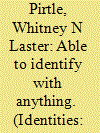

|
|
|
|
|
| Summary/Abstract |
The Apartheid South African state crafted Coloured racial identities through a powerful racial project that signified and positioned them as a group that was both neither and between White and Black. Non-Racialism in post-Apartheid South Africa has, however, loosened the role of the state in making race. So how has the transition of the state impacted ‘Coloured’ racial identities today? Informed by both macro-level theories of racial formation and micro-level theories of racial identities, I examine racial identity choices as constrained by the state among 50 adults. I find identities choices are influenced by transformations in the racial state: racialisation via reappropriating ‘Coloured’; re-formation and joining of ‘Black’; racial uplift construction as ‘Khoisan’; and a non-racialist approach to identity as ‘Human’. I argue transformations of the racial state shape, or even lead to, a transition in racial identities and therefore clarify theorises of co-constructed racial identity formations.
|
|
|
|
|
|
|
|
|
|
|
|
|
|
|
|
| 2 |
ID:
190919
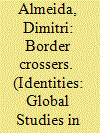

|
|
|
|
|
| Summary/Abstract |
Intra-urban borders are a pervasive feature in today’s global cities. They are not only the result of urban planning but they are also reproduced in everyday movements and interactions. Based on interviews and participant observation in French banlieues of Greater Paris, Mulhouse and Strasbourg, I analyse how inhabitants narrate movements in urban space that lead them to cross the boundaries of their neighbourhood. I build upon Lefebvre’s notion of spatial practice and insights from border studies to understand how these movements relate to the social production of urban marginality. The findings show how experiences and representations of intra-urban border-crossing among banlieue residents are shaped by and reproduce geographies of exclusion.
|
|
|
|
|
|
|
|
|
|
|
|
|
|
|
|
| 3 |
ID:
190924


|
|
|
|
|
| Summary/Abstract |
This article examines ‘de-stigmatisation strategies’ of Turkish-Dutch youth. Our in-depth interviews and observations revealed three strategies to negotiate belonging in the Netherlands, particularly to resist dominant Dutch characterisations of Turks and Muslims as backwards, disloyal and unintegrated: (1) confronting by asserting their right to cultural distinctiveness, (2) convincing by relocating cultural achievements in their heritage, and (3) contextualising: embracing ideological and political positions calibrated to country-specific contexts. We found that students’ de-stigmatisation strategies – which are learnt, contested and first performed within secure in-group settings – mobilise multiple, context-dependent identifications. Although students are often critical of the assumptions embedded in Dutch nativist discourse, their strategies also partly reproduce them, showing the pervasiveness of nativism within current political debates on culture, identity, belonging and nationality.
|
|
|
|
|
|
|
|
|
|
|
|
|
|
|
|
| 4 |
ID:
190922


|
|
|
|
|
| Summary/Abstract |
We argue that the stories told about the histories and nature of places, are vehicles for narrating race. Drawing on interviews with professionals and community workers in Butetown in Cardiff and Govanhill in Glasgow, we explore how they negotiated – and contested – racialized histories of place, constructing different versions or claims to belong. Drawing on Henri Lefebvre’s spatial concepts we explore this conceptualization through examination of the two areas that have distinct histories, and present experiences, of migration and racialization. In discussion of the accounts from the two distinct areas, we show that narratives of the past have a political resonance that shape accounts of current experiences of migration. Accounts of place are often related in relationship to comparisons with and narratives of other places and to global processes of trade and migration. Whilst these racialized narratives are contested, they also shape responses to social problems faced by communities.
|
|
|
|
|
|
|
|
|
|
|
|
|
|
|
|
| 5 |
ID:
190921
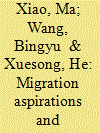

|
|
|
|
|
| Summary/Abstract |
Drawing on longitudinal research with 33 Chinese international students in 10 European countries, this article examines their polymorphic identifications towards homeland and asks how these changing perceptions constitute the underlying logic of their particular migration aspirations during the COVID-19. Specifically, the article explores how homeland identifications function as a driving force to facilitate ‘voluntary immobility’ in the study destination while being used as a tackling strategy to adapt to their ‘involuntary immobility’ overseas. It also examines how these identifications articulate with the students’ mixing and shifting migration aspirations formulated during the pandemic. In doing so, the article demonstrates that polymorphic perceptions closely relate to the generation, exercise and reproduction of their migration aspirations that are temporally distributed.
|
|
|
|
|
|
|
|
|
|
|
|
|
|
|
|
| 6 |
ID:
190920
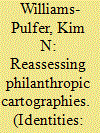

|
|
|
|
|
| Summary/Abstract |
The definition of philanthropy is contested with variations across time and global context. The article will centre on the Caribbean with its numerous identities to highlight inclusive philanthropic practices. Through an analysis of Caribbean history, theoretical foundations, and contemporary analysis, three social classes or ideal types are identified. These include 1) the colonial dominant, 2) the Black or creole middle class and 3) the resisters or grassroots/marginalized populations. Drawing on these ideal types, the analyzes three categories of philanthropic practice developing within and through the Caribbean, including 1) the philanthropy of colonial dominance, 2) philanthropy of cultural mediation and 3) philanthropy of anticolonial resistance. The Caribbean offers an ideal context for understanding traditional forms of philanthropic action and 'philanthropy from below,' highlighting issues of power, oppression, and social transformation that impact the region's ongoing development.
|
|
|
|
|
|
|
|
|
|
|
|
|
|
|
|
| 7 |
ID:
190925
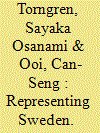

|
|
|
|
|
| Summary/Abstract |
In 2011, the Swedish national tourism organisation, Visit Sweden, together with the Swedish Institute, launched a campaign – Curators of Sweden (CoS) – on Twitter, which ended in 2018. Each week a ‘Swedish’ person was chosen as a curator to tweet whatever they liked through the @Sweden account. All the curators were chosen because they represented ‘values, skills, and ideas’ which, according to the campaign, ‘all combined, makes up Sweden’. In this article, we try to understand the contradiction of CoS offering a cacophony of ‘diverse’ voices from Swedes but, at the same time, speaking with the ‘same’ voice. Through dialogism, we locate the different voices, agendas and diverse contexts in reality, and examine how the values, skills and ideas were managed and engineered through the CoS, in a bid to imagine Sweden and Swedish identity.
|
|
|
|
|
|
|
|
|
|
|
|
|
|
|
|
| 8 |
ID:
190926


|
|
|
|
|
| Summary/Abstract |
Since the second half of the 20th century, the notions of hybrid, hyphenated and transcultural identity have found urgent currency for scholars interested in the Arab Anglophone literary movement. Several books and anthologies have situated Arab Anglophone writers within diaspora and multicultural studies. In particular, the fascination of Western academia has augmented comfortable diffusion and propagation of writers and critics endorsing these concepts. Whilst representing trans-cultural and hybrid identities is of immense importance when assiduously addressing issues of diaspora, migration, exilic consciousness, and dislocation, it has also become a ‘survival’ strategy for some ‘minority’ writers. The article challenges the claim that Arab Anglophone women writers’ depiction of hybrid identity is an expression of their lamentable state of affairs. It rather argues that those writers espouse strategic construction of hybridized identity to serve extrinsic aims related to recognition, canonization, and readership. This depiction is thus closer to an ‘essentialist practice’ than to a trans-cultural hybrid identity construction.
|
|
|
|
|
|
|
|
|
|
|
|
|
|
|
|
|
|
|
|
|